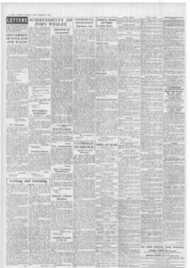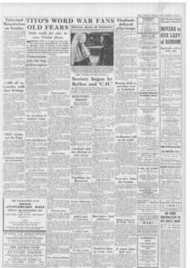Page 2, 4th September 1953
Page 2

Report an error
Noticed an error on this page?If you've noticed an error in this article please click here to report it.
Tags
Share
Related articles
Charity And Wesley
Charles Wesley's Hymns Sung In Rome Basilica
Nonconformity To–day (iii) By Stanley B. James
Christianity Outside The Church
Church Will Be Less Pompous, Says Jesuit
Doctrine of
'Assurance' Sta,-I am writing principally to reassure Mr. Poynter concerning the doctrine of "assurance" as held by John Wesley. This question was the main point of a lecture on "The Spirit in Nonconformist Spirituality" given by Mgr. H. Francis Davis at Oxford during the Unity Octave in 1950, and afterwards published by Blackfriars in The Spirit of Unity (price 3s. 6d.).
I would recommend all interested in the correspondence on this subject to read Mgr. Davis. He quotes what Wesley himself wrote on "assurance": "I believe a few, but very few, Christians have an assurance from God of everlasting salvation; and that is the thing which the Apostle terms the plerophory or full assurance of faith.
"I believe a consciousness of being in the favour of God (which I do not terw plerophory, or full assurance, since it is frequently weakened, nay. perhaps interrupted, by returns of doubt or fear) is the common privilege of Christians fearing God and working righteousness."
Mgr. Davis points out that to expect such a "consciousness of being in the favour of God" is nowhere condemned by the Church; and the fact that it was not condemned at the Council of Trent is all the more remarkable because, humanly speaking, many of the fathers of the Council started with a strong bias in favour of condemning it.
"Torquemada" might surely ask himself whether he really thinks that the life of the man whose name he has adopted bore better witness to Christ than the life of John Wesley. Certainly Wesley had every misunderstanding of the Church that one would expect in an 18th century English Protestant. He certainly believed in "justification by faith alone" in the sense of "no justification without faith-no matter what works you do": and in this sense the Church holds it too, though Wesley wouldn't have realised that. His sermons show plainly that he was far from supposing that one could be saved without the good works which are the fruits of grace. There is only one Christ-life, and Protestants too are baptised into it; their misunderstanding of the full implications in it of membership of the Visible Church are very apt to be our fault rather than theirs; surely none of us is going to deny that he or she does sometimes neglect the means of grace !
It seems unjust to the memory of Belloc to quote lines which he obviously meant as semi-nonsense verse as a serious guide to conduct; supposing one tries the effect of translating "Caritas non conturbat me."
Your contributor "Catholic Evidence."
Some Precedents
SIR,--"Torquemada's" theology is just as inaccurate as his quotation from Belloc (six mistakes in four lines).
Giving due praise to holiness outside the One Fold is only following the example of Cardinal Manning on General Booth, not to mention Our Lord on the Good Samaritan and elsewhere.
"MartInus."
'Too broadminded'
SIR-After that refreshing douche from "Torquemada," one is loath to disturb the Wesley fans further. Nevertheless, they should know that their hero (see Boswell's Hebrides Journal) took what Boswell metaphorically calls "a hearty drubbing" from Fr. O'Leary of Soho on account of Wesley's viciousness against the persecuted Catholics of his time.
Or should one apologise for the valiant Franciscan? 'There seems to be a lot of terrible broadmindedness about.
"Barabbas."
blog comments powered by Disqus







